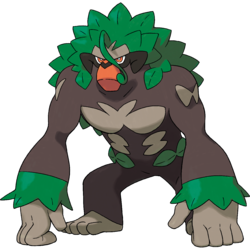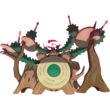From Bulbapedia, the community-driven Pokémon encyclopedia.
Rillaboom (Japanese: ゴリランダー Gorirander) is a Grass-type Pokémon introduced in Generation VIII.
It evolves from Thwackey starting at level 35. It is the final form of Grookey.
Rillaboom has a Gigantamax form that will appear in The Isle of Armor.
Biology
Rillaboom is a bipedal, ape-like Pokémon. Its body is mostly mud-brown in coloration, including its face and body, as well as its thick arms and legs. Its face has an orange mouth, with a dark brown nose. This dark brown coloration is also seen on its triangular ears, as well as under its eyes, which themselves have orange irises and white pupils. Its forehead is a light tan color, as well as its chest, abs, hands, and feet. It also has a bow-shaped mark of the same color on each shoulder. Rillaboom also has leaves protruding from its head, creating a thick bush of hair on its head, with a single vine that falls from its forehead like a strand of hair. It also has a belt and cuffs made of leaves. Rillaboom always carries its signature drum with it on its back, and pulls it out when engaged in battle. This bass drum is crafted from a tree stump, with several thick branch stumps protruding from it, which form both the legs of the bass drum as well as mid and high toms.
By drumming, Rillaboom can tap into the power of its special tree stump. The roots of the stump follow the direction of drumming in battle. A Rillaboom with the best drumming technique can become the leader of its troop. Due to its kind disposition, it values harmony within the group. Rillaboom is very sensitive towards discord that could threaten the group's harmony, so it keeps a strict watch for such actions. Due to its strong sense of unity, it will ferociously defend its allies from trouble.[1]
As Gigantamax Rillaboom, its upper body has been fused with its enlarged tree-stump drum. The stump has changed to resemble a full drum kit. The leaves expands to become four arms, each holding a drum stick while its single vine stands up and curls at the tip. Three red clouds float above it.
Rillaboom, as a result of Gigantamaxing, has become more powerful due to fusing with the drum. It can control the sticks of the drum to perform transcendental drumming techniques. It is compelled to drum due to its power building up from inside. The sounds it makes can reach across oceans and other regions. Those who hear the beat will start to dance uncontrollably.[2]
Rillaboom is the only known Pokémon capable of using the move Drum Beating and exclusive G-Max Move G-Max Drum Solo.
In the anime
Major appearances
Minor appearances
In the manga
In the TCG
- Main article: Rillaboom (TCG)
Game data
Pokédex entries
| This Pokémon was unavailable prior to Generation VIII.
|
| Generation VIII
|
|
|
Galar
#003
|
| Sword
|
By drumming, it taps into the power of its special tree stump. The roots of the stump follow its direction in battle.
|
| Shield
|
The one with the best drumming techniques becomes the boss of the troop. It has a gentle disposition and values harmony among its group.
|
|
|
Game locations
| This Pokémon was unavailable prior to Generation VIII.
|
|
|
Stats
Base stats
| Stat
|
Range
|
| At Lv. 50
|
At Lv. 100
|
100
|
|
160 - 207
|
310 - 404
|
125
|
|
117 - 194
|
229 - 383
|
90
|
|
85 - 156
|
166 - 306
|
60
|
|
58 - 123
|
112 - 240
|
70
|
|
67 - 134
|
130 - 262
|
85
|
|
81 - 150
|
157 - 295
|
Total: 530
|
Other Pokémon with this total
|
- Minimum stats are calculated with 0 EVs, IVs of 0, and (if applicable) a hindering nature.
- Maximum stats are calculated with 252 EVs, IVs of 31, and (if applicable) a helpful nature.
|
Type effectiveness
| Under normal battle conditions in Generation IX, this Pokémon is:
|
|
|
|
|
|
|
|
|
|
|
|
|
Learnset
|
|
|
|
- Bold indicates a move that gets STAB when used by Rillaboom
- Italic indicates a move that gets STAB only when used by an Evolution of Rillaboom
|
|
|
|
|
- Bold indicates a move that gets STAB when used by Rillaboom
- Italic indicates a move that gets STAB only when used by an Evolution of Rillaboom
|
|
|
|
|
- Moves marked with an asterisk (*) must be chain bred onto Rillaboom in Generation VIII
- Moves marked with a double dagger (‡) can only be bred from a Pokémon who learned the move in an earlier generation.
- Moves marked with a superscript game abbreviation can only be bred onto Rillaboom in that game.
- Bold indicates a move that gets STAB when used by Rillaboom
- Italic indicates a move that gets STAB only when used by an Evolution of Rillaboom
|
.
|
|
|
|
- Bold indicates a move that gets STAB when used by Rillaboom
- Italic indicates a move that gets STAB only when used by an Evolution of Rillaboom
|
|
|
|
|
- Bold indicates a move that gets STAB when used by Rillaboom
- Italic indicates a move that gets STAB only when used by an Evolution of Rillaboom
|
Evolution
Forms
Trivia
Origin
Rillaboom may be based on a gorilla with elements from drummers, most notably Taiko drummers. Its behavior may reference the fact that gorillas make drumming sounds by beating their chests to show social dominance. It may also take inspiration from the belief that music stimulates plant growth.
Rillaboom's Gigantamax form seems to draw inspiration from modern rock drummers.
Name origin
Rillaboom may be a combination of gorilla and boom.
Gorirander may be a combination of gorilla and 乱打 randa (battering).
In other languages
| Language
|
Title
|
Meaning
|
 Japanese Japanese
|
ゴリランダー Gorirander
|
From gorilla and 乱打 randa
|
 French French
|
Gorythmic
|
From gorilla and rythmique
|
 Spanish Spanish
|
Rillaboom
|
Same as English name
|
 German German
|
Gortrom
|
From Gorilla and Trommel
|
 Italian Italian
|
Rillaboom
|
Same as English name
|
 Korean Korean
|
고릴타 Gorilta
|
From gorilla and 타 (打) ta
|
 Mandarin Chinese Mandarin Chinese
|
轟擂金剛猩 / 轰擂金刚猩 Hōngléijīngāngxīng
|
From 轟雷 / 轰雷 hōngléi, 擂 léi, 金剛 / 金刚 Jīn Gāng, and 大猩猩 dàxīngxīng
|
 Cantonese Chinese Cantonese Chinese
|
轟擂金剛猩 Gwānglèuihgāmgōngsīng
|
From 轟雷 gwānglèuih, 擂 lèuih, 金剛 Gām Gōng, and 大猩猩 daaihsīngsīng
|
|
|
|
|
|
|
|
Related articles
Notes
External links

|
This Pokémon article is part of Project Pokédex, a Bulbapedia project that aims to write comprehensive articles on each Pokémon species, as well as Pokémon groups and forms.
|





















































